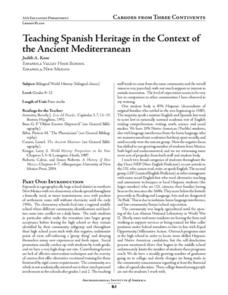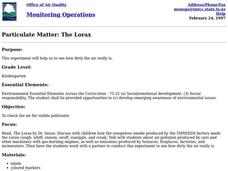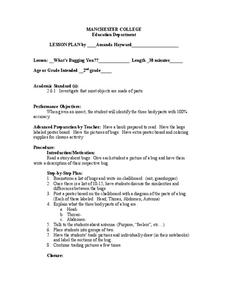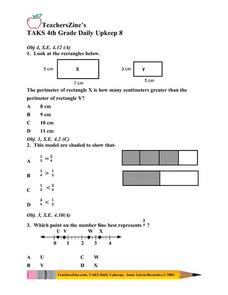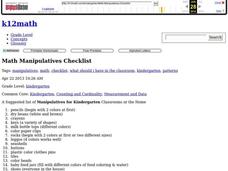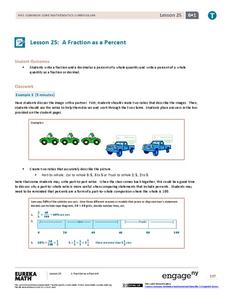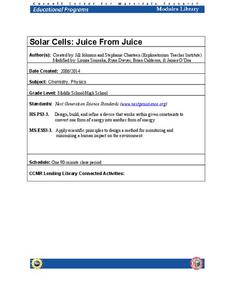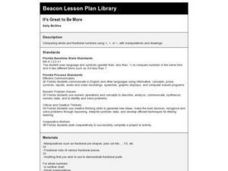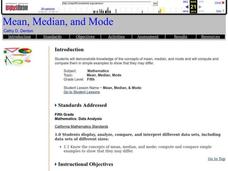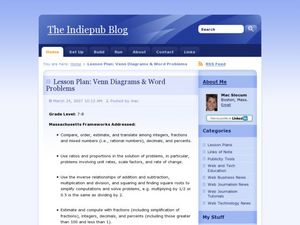Alabama Learning Exchange
Inner and Outer Planets
Learners explore the solar system. In this planets instructional activity, students learn about the other planets in the solar system. They watch a video clip from National Geographic on the solar system, compare and contrast the planets...
Curated OER
Striking a Balance
Young scholars simulate animals in a food chain. In this food chain lesson plan, students are identified as grasshoppers, frogs or hawks. Popcorn is spread across a lawn and young scholars are given baggies (stomachs) and colored sashes...
Curated OER
Haiku Wrap Up
Students create a haiku about the land formations they've studied. In this haiku instructional activity, students identify the metaphor and meaning of a given haiku, brainstorm comparisons for a landform photo as a class and choose one...
Curated OER
Teaching Spanish Heritage in the Context of the Ancient Mediterranean
Students identify and interpret Spanish heritage, including the Mediterranean culture, language, history, trade, and migration. Following, they began an in-depth study of Egypt, the Middle East, Greece, and Rome and were able to make...
Curated OER
Particulate Matter: The Lorax
Students explore air pollution. For this ecology lesson, students participate in an experiment in which 5 numbered jar lids are placed outside. Students bring one lid a day in until all jars are inside. Dirt specks are counted, observed,...
Curated OER
Philanthropy Framework
Students become community philanthropists. In this social studies lesson, students learn the definition of philanthropy and apply it to Martin Luther King, Jr. The next day, students complete 3 T-charts for 3 historical figures. Finally,...
Curated OER
What's Bugging You?
Second graders investigate insects. In this parts of a whole, 2nd graders discuss what the three body parts of an insect are as well as the antenna. Students create their own insect labeling each body part and antenna.
Curated OER
Paint's Family Tree
Students sort and classify the genetic traits of horses. In this heredity and genetics instructional activity, students read dialogue in a skit in which specific physical traits of several horses are described and a horse family tree is...
Curated OER
Biological Concepts
Students perform a transection of a redworm. They discuss spinal cord injuries in humans. Students compare the ability of the redworm to regenerate the ventral nerve cord with the inability of humans to repair damage to the dorsal nerve...
Curated OER
Exploring Special Lines
Students compare and order numbers. In this geometry instructional activity, students write equations for inequalities. They differentiate and apply concepts of triangular properties to solve problems.
Curated OER
Junk Yard Math
Third graders explore the process of place value and subtraction through regrouping and borrowing exercises. Several activities using manipulatives are utilized in the lesson.
Curated OER
Daily Upkeep 8
In this math worksheet, 4th graders complete a quick set of math problems where they first look at two rectangles and find the difference between the two in centimeters. Then, they compare two figures are select which fraction best...
Curated OER
Patterns
Explore early algebra by participating in a pattern identification activity using a random assortment of different household materials. The class creates, completes, and analyzes different patterns with the help of leggos, buttons,...
EngageNY
A Fraction as a Percent
It is all about being equivalent. Class members convert between fractions, decimals, and percents. By using visual models, scholars verify their conversions in the 25th portion of a 29-part series.
West Virginia Department of Education
The Debate - John Brown: Martyr or Madman?
Did he die for a cause, or was he crazy? Although the resource discusses John Brown and West Virginia history, many historical figures have the same reputation. Teach learners about different perspectives and highlight the importance of...
EngageNY
Displaying a Data Distribution
Pupils analyze a display of data and review dot plots to make general observations about the highest, lowest, common, and the center of the data. To finish, learners match dot plots to scenarios.
Cornell University
Solar Cells: Juice From Juice
Unleash the power of ... blackberries! Science superstars create solar cells using the juice of berries or leaves of a citrus tree in an engaging lab. In addition to offering a plethora of resources, the teacher's guide gives background...
Curated OER
Ratios
Sixth graders investigate the concept of ratios and how they can be used to represent the comparison of quantities. The activity is taught using a table or graph to compare two categories of data.
Curated OER
It's Great to Be More
Learners compare whole and fractional numbers using <, >, or =, with manipulatives and drawings.
Curated OER
Mean, Median, and Mode
Fifth graders compute the mean, median, and mode of sets of numbers.
Curated OER
Finding Sums to 6
Students explore the additive identity property where they add multiple numbers to get to the number 6. In this number 6 lesson plan, students also work on their addition charts.
Curated OER
Outdoor Survival
Students are introduced to basic outdoor survival concepts. They identify the seven basic needs for survival. Students describe the symptoms and treatment for frostbite and hypothermia. They compare and contrast the value of different...
Curated OER
Decimals in the Dugout
Students investigate place value and decimals during baseball related activities. In this place value lesson, students explore place value with decimals. Resources are included.
Curated OER
Venn Diagrams & Word Problems
Students explore the concept of Venn Diagrams through word problems. In this Venn Diagram lesson, students solve word problems about groups of people using Venn Diagrams. Students use survey results about MySpace and Facebook in a Venn...





